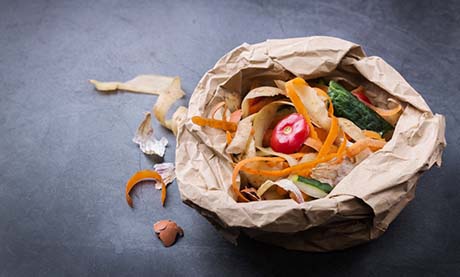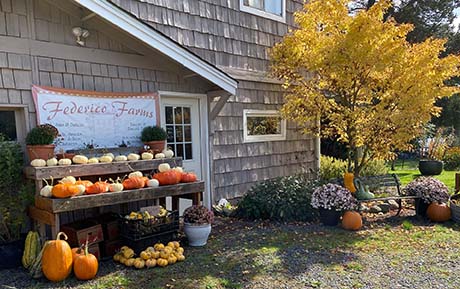Food Recovery – Why We Need To Care About Composting
Posted November 19, 2021 at 5:53 am by Tim Dustrude

Photo by Antonina Vlasova via Twenty20.com
The following is submitted by San Juan Island resident Angie Light with the Transition San Juan Waste Reduction Group…
My family and I are new to the island, and one of the many characteristics of San Juan that we love is the access to wonderful farms and farmers. Many an evening our family meal is made entirely from produce grown right here, in this soil, on this land by skilled and passionate people. I feel abundance and gratitude for our family’s ability to live by the true meaning of “farm to table.”
While this picture is dreamy, there’s another side to it that’s not utopic. It became glaringly clear that the scraps left over from our food create a whole lot of hefty weight in our garbage. Our beautiful food story unfortunately does not end happily with our farm to table bliss. It takes an alarming turn that continues with tons and tons of garbage bags riding the ferry back to the mainland. Filled with food waste, these garbage bags then travel by train to eastern Washington where they are buried in a landfill — a not so happy ending.
The question of how to keep our food out of our garbage quickly became an all-consuming concern for me. And why should you and I care about keeping food out of our garbage bags and changing this sad ending to the story? Three words: environment, finances, humanity…
The US Department of Agriculture estimates that 133 billion pounds of food equaling about 161-165 billion dollars’ worth each year is thrown away! That means that 30-40% of the food supply in America is either not harvested and left to rot due to imperfections, or wasted in homes – and then thrown into landfills. I have read estimates from World Vision that the average single-family household in North America wastes 600 pounds of food per year. Per household this equals roughly $135 per month in the trash along with that uneaten and wasted food.
The real horror behind the billions of pounds of food waste is the fact that any food or organic matter that finds its way into landfills creates methane, a toxic greenhouse gas. In 2017 the U.S. Environmental Protection Agency issued data showing that food is the single largest category of material placed in municipal landfills creating the third-largest source of human-related methane emissions in the US. Methane emissions are the second most toxic source of greenhouse gases and a direct link to climate change. Food needs to avoid landfills.
I know many of us would agree that learning to live a more sustainable life is absolutely necessary, and it is also extremely challenging. However, keeping food out of landfills is in fact very achievable. It’s low hanging fruit, so-to-speak, (yes, pun intended!). To farmers and gardeners alike, compost, or the breakdown of organic matter into its most potent nutritional form, is black gold. It’s incredibly important to the production of healthy soil needed to grow successful crops. That rotting mess of unused lettuce in your fridge is not waste, it’s a harvest waiting to happen.
There are many ways to compost such as worm bins, aerobic bins or turning a barrel. Some are passionate about making their own compost right in their gardens, but for a lot of us, my family included, that’s just not possible. At least it wasn’t — until I learnt about Federico Farms, right here in San Juan island.

Federico Farms is offering an exciting and unique composting program taking not only the usual suspects of food scraps, but also meat, meat by-products, and dairy. Federico Farm knows my leftover salad and chicken bones from dinner, the kids’ half-eaten turkey sandwich, and the well-intended wilting remains of cilantro in my fridge are energy and nutrients for their farm soils. Through a composting process of fermentation with specialist bacteria, the breakdown of organic matter happens more efficiently. This in turn allows the harvested compost, and all those rich nutrients, to be put back into the soil faster. The food scraps left over from the food I purchased from either Federico Farms or any other farm on the island is harvested to create soil amendment for future crops. What a win for everyone – consumers, farmers and the environment!
But it can’t just stop there! There are many communities in our corner of the world that offer industrial composting programs. And there is a very real necessity and glaring opportunity for San Juan County, Friday and Roche Harbor to take more action to address the need for a larger scale industrial composting program. This would not only help capture food waste from larger operations such as grocery stores and restaurants, but also all that well-intended compostable packaging. As good as compostable packaging is, if there’s not a place for it to be composted, all that packaging is in fact still garbage.
And what about humanity? How does that all come into the equation? The group Feeding America estimates that 38 million people face hunger today in the United States. Recovering food not able to be sold by farms or grocery stores for marketing reasons and making it accessible for those in need is helping to take care of those in our community and keeping that usable food out of the landfill. There are several fantastic organizations nationwide that have made it their mission to recover food from farms and grocery stores and get it directly to those who need it. Here on the island there is the San Juan Island Food Bank, the San Juan Island Food Hub and the Nourish to Flourish program all who talk directly with farmers, local businesses and community members to help highlight farmers and their produce and to help access food that could be gleaned or donated for those who are in need of it.
You might say, but we’re just a small community and what we do won’t make that much of a difference. It makes a difference to our precious island and marine environment that is not immune to climate change. It makes a difference to the farmers making a living growing our food. It makes a difference to the children accessing the lunch program at school. It makes a difference to us all financially through the costly resources used to deal with our garbage and the costs to mitigate damage done by our garbage. Small local actions build big change environmentally, financially and socially.
To take action now on composting for San Juan Island, let our town, county, and port representatives know that it’s time to get serious about an industrial composting system. Then, contact Federico Farm [email protected] where you can either request to purchase a 5 gallon compost bucket from them ($15), or simply use your own. Toss that soggy lettuce in and sprinkle some of the inoculant ($5 a bag and purchased in their farm store) on top each time you add scraps. Once your bin is full -our family of 4 fills a 5 gallon bucket each week- head out to Federico Farms and dump it into their compost bins. This is definitely not curbside pick-up, but come on folks, nothing is far on this island, however, your efforts are far reaching.
Taking our compost bin out to Federico Farms once a week has become a fun and fulfilling family ritual. We dump the compost, pick up eggs and other goodies, chat with the farmers and drive home knowing we’ve built a much better ending for our food story. Because no part of food is waste, it’s a harvest waiting to grow. Let’s keep our food out of landfills and recover those nutrients, those dollars and our humanity!
You can support the San Juan Update by doing business with our loyal advertisers, and by making a one-time contribution or a recurring donation.
Categories: Business, Community, Environment
One comment:










One comment...
Great piece with background and good, practical advice! I hope a county-wide program gets started. In the meantime, we’ll be looking at the Federico Farms option as well as the Lomi home composter: https://pela.earth/lomi
By submitting a comment you grant the San Juan Update a perpetual license to reproduce your words and name/web site in attribution. Inappropriate, irrelevant and contentious comments may not be published at an admin's discretion. Your email is used for verification purposes only, it will never be shared.